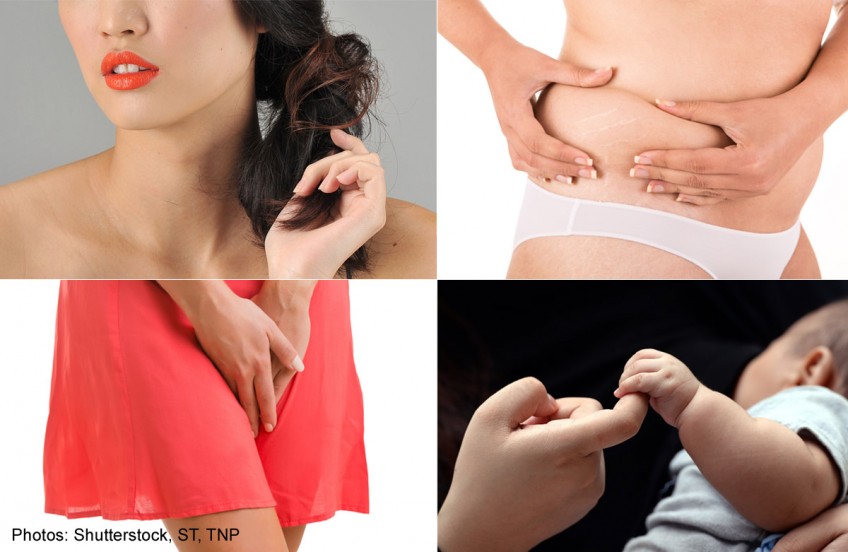New mum, new problems

You went through many changes during pregnancy, but you may have a new set of problems after giving birth. Here's how to get through eight common ones.
1. Problem: My hair is falling out.
Why: During pregnancy, the reproductive hormones produced by your body extend the growth of your hair's life cycle. This results in less hair falling out while you are expecting your baby.
After childbirth, your reproductive hormone levels start to fall and many women think they are losing hair, when it is just the cycle returning to normal.
This is a temporary phase, said Dr Chang Tou Choong, a consultant obstetrician and gynaecologist at Thomson Medical Centre.
Solution: Until your hair growth cycle returns to its pre-pregnancy state, keep your locks healthy with a mild organic shampoo or baby shampoo, advised Dr Chang.
2. Problem: Those stretch marks will not go away.
Why: If you gained a lot of weight during pregnancy, carried a big baby, had increased amniotic fluid levels or carried multiple babies, you may have developed unsightly lines on your tummy and thighs.
Solution: There is no way to get rid of stretch marks for good, said Dr Chang. They should diminish on their own about a year after delivery.
3. Problem: My nipples are sore and cracked.
Why: If your nipples hurt while you are breastfeeding, it is likely due to poor positioning or latch-on, said
Ms Cynthia Pang, assistant director of nursing and senior lactation consultant at KK Women's and Children's Hospital (KKH).
Solution: If you feel any soreness, consult a lactation consultant to learn the correct technique. Meanwhile, soothe the pain with a nipple cream. Continue to nurse while the nipples heal.
4. Problem: My breast is as hard as a rock.
Why: You may have blocked milk ducts or mastitis, which are common breast infections among nursing mums. Blocked ducts result when you do not drain your breast properly while breastfeeding, or if you wear tight or restrictive clothing. The blockage causes part of the breast to feel lumpy, hard and sore.
Blocked ducts can develop into mastitis if not treated adequately.
Solution: Drain your milk supply by feeding or expressing regularly. Massage the breast gently before every session. And keep nursing as this helps to unclog the blockage and clear up the infection, said Ms Pang. You may use painkillers or apply a cold compress to the affected area.
5. Problem: I am not sure if I love my baby.
Why: You could be hit by post-natal depression, said Dr Theresa Lee, senior consultant at the department of psychological medicine at KKH.
Common signs include feeling moody, tearful and easily irritated, as well as having a hard time connecting with your newborn and poor concentration or forgetfulness.
Solution: Share your feelings with your loved ones. Ask them to help care for the baby. The problem can usually be resolved spontaneously, said Dr Lee. But see a doctor if the low mood persists and you are crying almost every day for more than a week. This is especially important if you have thoughts of hurting yourself or your baby.
6. Problem: I am leaking urine again.
Why: Carrying your baby for nine months can weaken your pelvic floor - the tissues and muscles that support your bladder, bowel and uterus. When your pelvic floor is weak, you may find it hard to squeeze the sphincter muscle to stop your urine from flowing out when you sneeze, cough, laugh or exercise.
Solution: Kegel exercises - in which you squeeze your sphincter muscle of the bladder for a few seconds and then release it - are helpful, but you need to do them regularly for them to be effective.
Dr Yong Tze Tein, a senior consultant at the department of obstetrics and gynaecology at Singapore General Hospital, recommends 10 repetitions three times a day for four to six weeks.
Schedule a visit to the doctor if there is no improvement or if the problem affects you socially. Wear incontinence pads until you regain control of your bladder.
7. Problem: Not tonight, honey.
Why: Pain in your pelvic area can put you off sex. Dr Yong said the wound should heal one to two weeks after delivery. If you are breastfeeding, it can cause vaginal dryness, which can make sex uncomfortable.
A lack of time and energy after the arrival of the newborn can make you lose interest in sex. You may also feel conscious about your post-baby body because of weight gain, stretch marks and other issues.
Solution: Get a lubricant to help with the dryness and make sex more enjoyable. Dr Yong noted that it is important to set aside time to reconnect with your spouse and communicate your feelings.
8. Problem: My back is killing me.
Why: Back pain after delivery may be due to incorrect postures when sitting, standing while carrying your baby, changing diapers and breastfeeding, and joint laxity, says Ms Cammy Tsai, a senior physiotherapist at the department of rehabilitation at National University Hospital. Joint laxity can persist for up to three months after giving birth.
Solution: Watch your posture and do gentle back exercises, said Ms Tsai. Make sure you get enough rest in between workouts and avoid lifting or doing anything strenuous.
It helps to see a physiotherapist who can assess your body movement and posture, and come up with a treatment plan.
If you want to get rid of knots in your back at a spa, be careful that the therapist does not twist your back or neck as this may aggravate your condition.

Visit Young Parents for more stories.